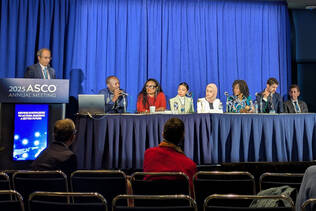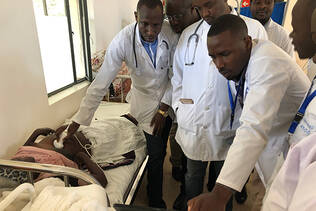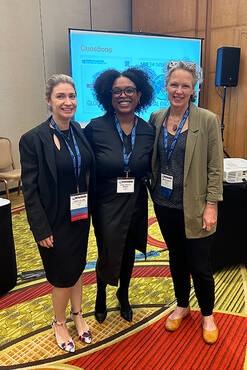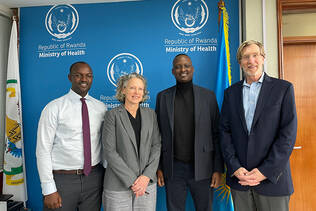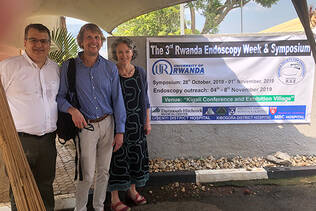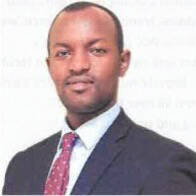Our Global Oncology programs are designed to be scalable, generalizable, and build research capacity in hosting countries. Wherever we go, investigators and clinicians, patients with cancer and their families, and local communities become authentic partners dedicated to being part of evidence-based solutions to the worldwide cancer burden.
Our goals
Globally, cancer is rising and hits hardest in the very locations where resources are limited. grams is a key component of our work.
Since the Dickey presidency (1945 to 1970), Dartmouth College has been committed to solving the world's most challenging problems. Today, we have multiple faculty involved in programs around the world offering exchange programs focused on education, infectious disease management, cancer screening, endoscopy training, and oncology.
These objectives are also consistent with the policies and priorities of our partner institution, Dartmouth's Center for Global Health Equity, through which we build programs with partners in Rwanda, Honduras, Kosovo, and Ghana.
First Global Oncology track fellow
We are pleased to announce our first Global Oncology track fellow from the Dartmouth Hitchcock Medical Center Hematology-Oncology Fellowship class of 2020. Dr. Victoria Forbes, just received promotion to Associate Professor in Medicine, Hematology and Global Oncology at the University of Connecticut!
DCC has been a leader in global oncology consulting and education since 2015 and is now partnering with the Ministry of Health of Rwanda to develop and sustain subspecialty training programs, including fellowships in gastroenterology and medical oncology. These fellowships are staffed by international faculty from all over the world.
What we do
Currently, Dartmouth Cancer Center (DCC) teams are leveraging our strength as an NCI-designated comprehensive cancer center to significantly impact three areas of global oncology relative to low- and middle-income countries (LMICs):
- Training in critical subspecialties like gastroenterology and medical oncology
- Research on molecular differences and targeted therapies in breast cancer
- Education and capacity building for international translational research in oncology
Research for prevention and treatment
DCC is at the forefront of evidence-based solutions for outreach to people with limited access to surveillance of cervical cancer recurrence in women with HIV in rural Rwanda. Our commonsense approach utilizes existing healthcare infrastructure at a decentralized village level to build capacity for cancer surveillance. By involving local leaders, medical students, pathologists, and clinicians, we have designed an approach for cancer surveillance that can be applied to screening, implementation, and pathology in the most challenging locations of the globe.
DCC responds to the need to build capacity in low-income countries
Trained scientists are scarce in low-income countries, and we build local capacity by facilitating communication, mentoring, and investment in future collaborators. In Rwanda, we have over nine years of building human capacity in education and research through affiliation with RD Rwanda, Rwanda Cancer Center, Dartmouth, on-line and on-site teaching, and internet-enabled case conferences. Medical graduates from Kosovo, Tanzania, Rwanda, and Honduras have come to DCC for specialty training experiences. The Global Oncology and Disparities of Care international forum enables monthly DCC and University of Connecticut faculty-led live international medical education sessions and research collaboration virtually.
Opportunities for training with world-class faculty
The distinctive DCC Hematology-Oncology Fellows training program offers a unique global oncology elective featuring Dartmouth-mentored onsite clinical training at the Rwanda Cancer Center in Kigali, Rwanda for our Fellows, who experience learning oncology as practiced in a low-income country and teaching it to a multinational cadre of African MDs. Dr. Ivy Riano Monsalve joined the DCC faculty in 2024 in Melanoma and Thoracic Oncology after completing a fellowship at DHMC with a global oncology focus in Rwanda. Dartmouth Health is recognized in Rwanda as a leading partner in innovative translational oncology research.
Our faculty's commitment to global work has resulted in international recognition of our fellowship program, which attracts highly skilled graduates interested in pursuing their global oncology careers at Dartmouth Hitchcock Medical Center. With broadening research interests in Global Oncology, Dartmouth is uniquely poised to obtain external funding in collaboration with our colleagues in Low Resource settings through Fogarty Grants and other NIH or NCI-sponsored funding platforms.
Dartmouth Without Borders
Dartmouth Without Borders (DWB) is a Prouty team formed in 2019 by Dr. Chamberlin and Jane Mclaughlin to unite the myriad international projects the Dartmouth community is involved in, such as Rwanda Endoscopy Week of the Dartmouth Gastroenterology team, led by Steve Bensen, Joel Goldberg from Harvard, Tim Gardner, and others to offer endoscopy training to Rwandan doctors. DWB has joined GI Rising, LLC to offer oncology lectures and research collaborations to kick off the new Gastroenterology Fellowship Program at the University of Rwanda.
Thanks to the generosity of Jane and Peter McLaughlin, we can sponsor our first Dartmouth Cancer Center Global Oncology Visiting Research Scholar, Dr. Fidel Rubagumya, for an education and research exchange over three years as he finishes his PhD in Medicine. With his leadership, Dr. Chamberlin and others launched the first Medical Oncology Fellowship program at the University of Rwanda in May 2024. DWB provides research funds to our Global Oncology Fellows at Dartmouth to foster international collaborations.
Dartmouth Cancer Center Program for International Cancer Scholars
Dr. Fidel Rubagumya the first Dartmouth Cancer Center Global Oncology Visiting Research Scholar, received his medical degree from the National University of Rwanda. He completed his medical internship at Butaro Cancer Center of Excellence and received his Master of Medicine in Clinical Oncology from the Muhimbili University of Health and Allied Sciences.
Dr. Rubagumya was a General Practitioner at the Butaro Cancer Center of Excellence before joining the Muhimbili University of Health and Allied Sciences. While he treats all cancers, he has a special interest in head and neck cancers, gynecological and gastrointestinal cancers, and cancers that affect special groups. He also has a keen interest in end-of-life care and global oncology.
Dr. Rubagumya is an enthusiastic cancer advocate. He has been involved in many cancer control activities in Rwanda and internationally. Dr. Rubagumya is the Founder of Rwanda Children's Cancer Relief (RCCR), an organization that raises awareness of childhood cancers and advocates for children living with cancer and their families. Before founding RCCR, Dr. Rubagumya was actively involved in breast cancer advocacy work with Breast Cancer Initiative East Africa (BCIEA). He is a member of numerous cancer organizations, both locally and internationally. Dr. Rubagumya is a recipient of many prestigious awards, including the American Cancer Society Global Scholar Award, the International Development and Education Award (IDEA) of the American Society of Clinical Oncology, and both the International Cancer Research Technology Transfer Fellowship (ICRETT) and the African Cancer Fellowship awards of Union for International Cancer Control (UICC} and Africa Cancer Leader Institute award of African Organization of Cancer Research and Training (AORTIC), among others. Dr. Rubagumya's research focuses on integrating technological advances like mobile applications to improve cancer care in low resource settings. He was awarded the ASCO International Innovation Grant for his mobile application, which was used to help increase the early detection of skin cancers in people with albinism.
